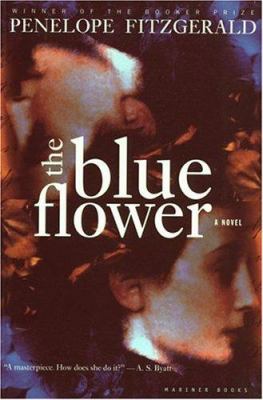
by Penelope Fitzgerald
Library Journal
: Fitzgerald never repeats herself, and her latest novel, named Book of the Year by 19 British newspapers in 1995, is her most original book yet. Here she reconstructs the life of 18th-century German romantic poet Novalis, focusing on his boisterous family, his struggle to articulate his longings, and, most tellingly, his passion for 12-year-old Sophie, a simple child he intends to marry despite the furious reservations of family and friends. Fitzgerald doesn't make it entirely clear what draws Friedrich von Hardenberg (Novalis's real name) to little Sophie--but that is precisely the point. Throughout, he is carried aloft by an inchoate desire for something beyond that is summed up in his little story of the blue flower: "I have no craving to be rich, but I long to see the blue flower....I can imagine and think about nothing else." As a counterpoint to her protagonist's beautifully captured romanticism, Fitzgerald successfully evokes the sights, sound, and smells--and the constant sorrows--of domestic life in 18th-century Germany. A little treasure; highly recommended. Barbara Hoffert, "Library Journal" Distributed by Syndetic Solutions Inc. Terms
Publishers Weekly
: In the introduction to his translation of Novalis's Henry von Ofterdingen, Palmer Hilty described Sophie von Kuhn as "a callow, undistinguished girl of Thuringia." Not a terribly inspiring subject, unless the writer is Fitzgerald, the author of the 1979 Booker Prize winner Offshore and a shortlist perennial for the prize. Fitzgerald presents a brilliant, subtly ironic portrayal of Friedrich von Hardenberg (aka Novalis) as an anti-Pygmalion who takes an unformed, all-too-human girl and fires her into an image of chaste muse. After a strict Saxon upbringing and an education at Jena that revolved around Fichte's idealism, Hardenberg meets the 12-year-old Sophie and falls immediately in love. Sophie is neither particularly pretty nor smart (her diary entries run to "We began pickling the raspberries" or "Today no-one came and nothing happened"), but she is optimistic, innocent, malleable. Their three-year courtship parallels her losing battle with tuberculosis; when she dies at 15, she is petrified as the vulnerable, ethereal and pure muse. There's scads of research here, into daily life in Enlightenment-era Saxony, German reactions to the French Revolution and Napoleon, early 19th-century German philosophy (by page two, a fellow Fichte devotee announces, "there is no such concept as a thing in itself!"). But history aside, this is a smart novel. Fitzgerald is alternately witty and poignant, especially in her portrayal of the intelligent, capable women who are too often taken for granted by the oblivious poets. Fitzgerald has created an alternately biting and touching exploration of the nature of Romanticism--capital "R" and small. Copyright 1997 Cahners Business Information, Inc. Distributed by Syndetic Solutions Inc. Terms
|